Belief and passion – key advice from women in science
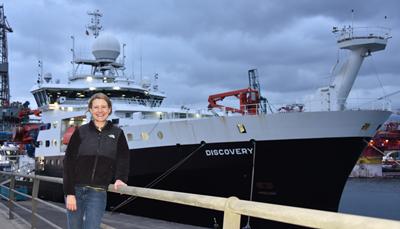
The University of Southampton is home to amazing and talented women with expertise and experiences across a range of science - all of whom have a passion for their specialist subjects.
As we mark International Day of Women and Girls in Science 2021, here is just a small sample of their stories and the aspirations they have for others who they hope to encourage to follow in their footsteps.
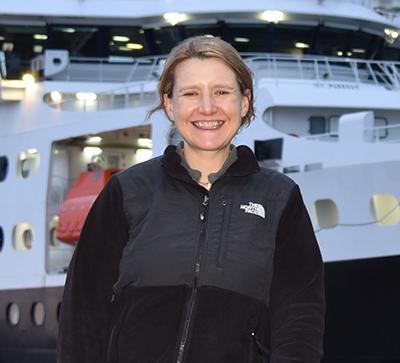
Dr Catherine Rychert
Dr Catherine Rychert is an observational seismologist in Ocean and Earth Science at Southampton, “which means I study earthquakes and the waves that they generate,” she explains.
“I use the seismic waves to image and understand the inner workings of the Earth, from the surface to the core.”
For example, the earth is moving under our feet due to plate tectonics, but there are still some big mysteries about how and why the tectonic plates are moving, how they form, age and are destroyed. Seismic waves allow us to look at the structure of the earth, which we can use to test hypotheses about what drives the plates.
“My research on plate tectonics is important for our understanding of how plate tectonics works, which is necessary for a better understanding of the evolution of the planet and planetary habitability, the reason why earthquakes occur and where and why volcanos erupt,” she says. “ There are also large implications for our understanding of climate change.”
For Dr Rychert, science is an adventure, and she says that she learns something new every day.
“I am thrilled every time I see/learn something new, it makes me feel like an explorer! Also, in order to study the world, you have to travel to lots of different parts of it. In the course of my research I’ve been to parts of the world that very few people have seen, and I also get to experience it in different ways than I would as a tourist.”
To date, she has seen remote parts of Central America, the East African Rift, Easter Island and the East Pacific Rise and the Mid-Atlantic Ridge, if you consider shipboard sonar imaging as “seeing” for the last two.
“I’m always inspired by the stories of people like Ada Lovelace, Marie Curie and Marie Tharpe, and I think that things are definitely better for women in science now than it was for them,” she reveals. “However, I still think that we have a way to go to get to a level playing field.
“The classic problem is that women feel they need to work harder to get to the same level – they do,” she continues. “However, one step would be for women (and men) to realise this, and make more effort to make time for women to think and be a person (not just work).”
Dr Rychert's key advice to other girls and women looking to get into the same field . . .
“I have three daughters. I would say: Stick with your dreams, don’t give up! It is not always easy. You might face negativity. Keep going. Find mentors if you can and make use of them. Mentor colleagues yourself. Work smarter not harder if you can find a way (see comment above about working hard). Science is an amazing journey, embrace it.”
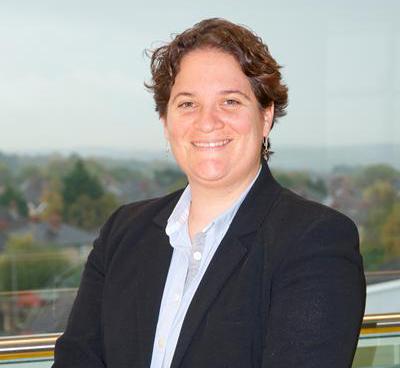
Professor Athina Vlachantoni
Athina Vlachantoni is Professor of Gerontology and Social Policy in the Centre for Research on Ageing at the University. Gerontology is the study of ageing over the lifecourse, and social policy is about individuals’ and families’ needs in society and how the welfare state can address them.
“My day-to-day work is a combination of teaching, research and administration,” she says. “I teach postgraduate students and supervise PhD students and I work alone and with colleagues to examine key research questions in several areas related to areas like informal care provision, health inequalities, pension protection among minority ethnic groups, intergenerational support and social care.”
Professor Vlachantoni also has a number of senior administrative roles, for example she is Director of Programmes for the University’s Department of Gerontology, and also Director of a partnership between Southampton, Brighton and Portsmouth Universities, which awards MSc and PhD scholarships every year.
“There are two bits of my work that I really like, and both of them have to do with working with other people,” she continues. “I love working with colleagues, for example in research. Being part of a research team means that the team collectively draws on different people’s strengths, and that’s really rewarding when we are successful.”
For example, one of the teams she works with was recently awarded a national prize by the Economic and Social Research Council, who fund much of their research, for the impact of that research work on society.
“This was one of the top-3 highlights of my career so far,” she enthuses. “Belonging to a team also helps when we are not successful, because we can reflect on what we can improve together, and come back stronger, whether it is an article or grant rejection. And I love working with students – literally every single time I teach, I learning something new.”
Professor Vlachantoni believes that being a woman in Social Science is quite different from being a woman in the natural sciences.
“I have been part of all-women teams, and part of teams where I was the only woman,” she reveals. “I genuinely think that individuals’ personalities and ways of working are more important than their gender. I think probably the only difference, and it’s a big one, is that I have seen more women openly juggling their work with caring responsibilities and being more vocal about their rights and challenges.
“Men do a lot of caring too, but they are less vocal about it, and I think that’s something that has been changing since I started,” she adds. “I also think that Social Sciences are far less hierarchical than when I started, there is more space for established views to be challenged, and that’s a good thing.”
Professor Vlachantoni's key advice to other girls and women looking to get into the same field . . .
“Speak to people who are one step ahead in their career (as opposed to a decade ahead), in order to get different views about what is needed for that next step. What are the costs and what are the benefits? This is especially important at key points of the lifecourse when one’s career has to be juggled alongside other things, like investing in a relationship, trying for a family or caring for different people in one’s family.”
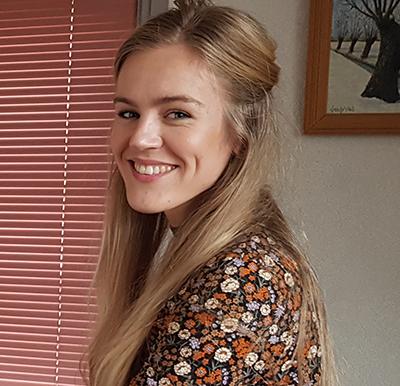
Iris Kramer
Current PhD researcher Iris Kramer is a Royal Academy of Engineering Enterprise Fellow, working with Future Worlds, the University's on-campus startup accelerator, to commercialise the research she has created during her doctoral studies in Machine Learning in the Vision, Learning and Control Research Group.
“I created an approach to automatically detect archaeological sites from earth observation data,” she explains, “I was the first PhD student to use deep learning for this task and it was really successful with more than 100 newly-detected archaeological sites on the Isle of Arran in Scotland.”
She was really excited by the idea of commercialising this research because of the potential to scale the approach across the world and detect new sites everywhere. “Knowing where sites are located is key to the protection of our heritage so being able to contribute to that I feel is really important,” she enthuses.
Iris says she is constantly learning new skills, meeting interesting people and working on exciting technology.
“I also get to discover new archaeological sites and being the first person to see the site is really exciting and makes me wonder about the artefacts that may be underground,” she continues.
And, whilst she is still early in her career, she has had only positive experiences so far.
“I don’t think being a woman has hindered me at all,” she asys. “The people around me have been very encouraging, potentially more so because in the past it was more difficult for women in science; I hope that my experience is a sign that the computer science community is great for women to be part of.”
Iris's key advice to other girls and women looking to get into the same field . . .
“If technology excites you than explore a career into it! Find out what you like and what you’re good at and you’ll have a great career. A bonus is definitely that most technology jobs also pay well and you all deserve a great salary and that will help us close the gender pay gap.”
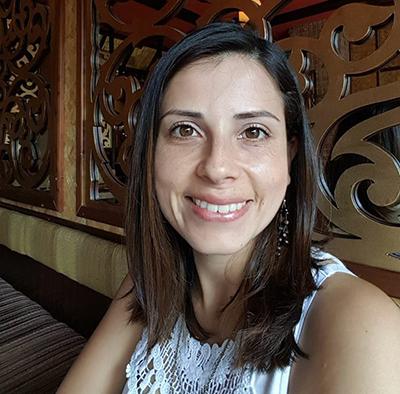
Dr Diana Garay-Baquero
Dr Diana Garay-Baquero is a researcher in Clinical and Experimental Sciences within the University’s Faculty of Medicine. Studying in her home country of Colombia, as a Major in Chemistry and Education, Dr Garay-Baquero became fascinated with the diversity of mechanisms that proteins use to mediate all sorts of biological functions and decided to do a Master’s degree in Biochemistry.
“My project involved the analysis of proteins express on cell membranes associated with invasive cervical cancer,” she explains. “This project allowed me to visit Brazil to train in mass spectrometric techniques and got me interested in pursuing a PhD.”
She recently completed that PhD in Biomedical Science at the University of Southampton where she focused on finding new protein biomarkers to improve diagnosis of tuberculosis.
“Currently, I am a postdoctoral researcher investigating unconventional T cell responses in human tuberculosis,” she continues. “Additionally, I have established a collaboration with Colombian researchers to apply three-dimensional cell culture models to explore the immune response to Leishmania infection.”
Dr Garay-Baquero says that she has two big passions – education, as a way to promote social development, and translation of biomedical researchm to improve life quality.
“I really enjoy learning about how our body responds to infection and diseases, and how this knowledge can be used to improve prevention, treatment and diagnostics,” she reveals. “I really love working in multidisciplinary groups, since I strongly believe that collaboration across disciplines and research groups is key to keep advancing knowledge and innovative solutions to face global healthcare challenges.”
She says that being a scientist is a central part of her identity that lies beyond her gender or nationality.
“Before I moved to Southampton for my PhD, I experienced how challenging is to do exciting science in a country with limited resources, but I had the support of many female supervisors and colleagues that inspired me to pursue a career in academy,” she continues. “Although, I have been very fortunate to be part of extraordinarily supporting teams during my PhD and current post, I know this is not the case for everyone. We still need to keep actively working to ensure equal opportunities for all to access and progress in STEM careers.”
Dr Garay-Baquero's key advice to other girls and women looking to get into the same field . . .
“Feel passionate about science be prepared to believe in yourself, in the work you do and in your own strengths. Do not feel afraid of trying new things, learning from scratch, exploring new avenues and reach out to others. Be brave and believe in your passion.”
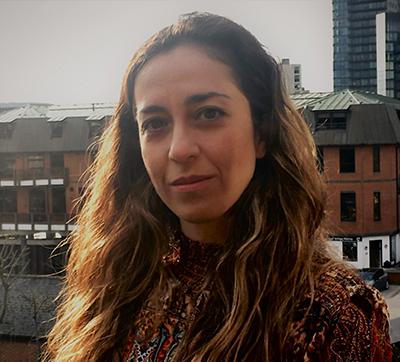
Dr Dimitra Georgiadou
Dr Dimitra Georgiadou is Senior Research Fellow leading the Flexible and Organic Nanoelectronics Theme in the Centre for Electronics Frontiers in Southampton’s Zepler Institute for Photonics and Nanoelectronics where she is currently performing research in the field of organic and flexible electronics.
“These are ultralow-cost, lightweight and flexible electronic devices, like displays, photovoltaics, photodetectors and memories, which are made with materials based on carbon rather than silicon and can be manufactured on thin, flexible, stretchable substrates,” she explains.
Organic electronic devices are more energy-efficient and eco-friendly than conventional silicon electronics and are fabricated using methods that are resource-efficient, leading to an overall more sustainable electronics world.
“I recently demonstrated light-sensors and radiofrequency devices that have a direct impact on future wireless communications and the Internet of Things,” she continues.
What she loves most about her work are “the priceless - but rare - “Eureka” moments, when I realise I have discovered something that no one else has observed before,” she reveals. “Then the fact that science breaks almost all barriers, from age and nationality to gender and race. I realise it every time I travel to attend a scientific conference and, for example, I find myself conversing with Nobel laureates and postgraduate students with the same enthusiasm.”
Dr Georgiadou says that she’s never considered being discriminated as a researcher because she was a woman.
“However, there are still some stereotypes, especially when women decide to start a family,” she says. “I believe the mentality of men has nowadays changed a lot to gradually accept the multiple roles that women play both in the family and their professional life and become more supportive to this.”
Dr Georgiadou's key advice to other girls and women looking to get into the same field . . .
“Being a woman should not affect at all your decision to become a researcher. Passion for science is genderless!”
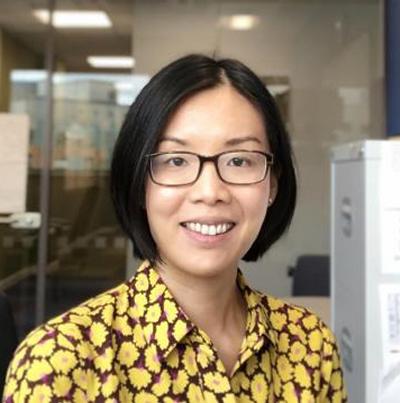
Dr Sean Lim
Dr Sean Lim is a Consultant Haematologist in University Hospital Southampton and a cancer researcher with the University of Southampton. Her position is generously funded by Cancer Research UK.
The strategic placement of her lab in the Centre for Cancer Immunology, next to Southampton General Hospital, means that she is able to see and treat patients with lymphoma and easily undertake research simultaneously.
“The aim of my research is to find new and effective cancer therapies by manipulating the body's immune system, or cancer immunotherapy,” she explains. “The immune system is highly capable of destroying cancer cells, but when it fails, cancer ensues. We now recognise that we can re-awaken and engage the immune system to destroy cancer cells through the use of antibodies.”
Dr Lim says that she loves the diversity of her work.
“I enjoy seeing and speaking to patients and their loved ones, but I also have the unique ability to unpick clinical problems in my laboratory,” she says. “Every research project I undertake has been chosen by me, and so it is always fascinating for me, and there's never a dull day's work.”
In her experience, Dr Lim says the numbers of women in science are increasing but there is still far less women than men at the top.
I'm often sat in a meeting where I'm either the only woman, or one of a few,” she continues. “Science is a tough career for all. Behind the few successes are a multitude of failures. Being a woman in science poses further challenges because the timing for a PhD and starting a family often coincides.
“I also think we all want to care for our family first, be it children or elderly relatives, which means we have less time for work,” she adds. “But I think these traits also give us the ability to balance multiple responsibilities more effectively.”
Dr Lim believes there are more initiatives to address the relative paucity of women in science now than there was over a decade ago when she started, such as mentorship schemes and flexible working. “However, it is clear that we are still not quite there yet,” she emphasises.
Her key advice to other girls and women looking to get into the same field . . .
“To anyone interested in science, I would say it isn't for the faint-hearted but it is extremely rewarding when we succeed in solving that bit of a puzzle. To the girls and women - don't be put off by the relative lack of women. Don't let your careers be defined by your gender.”
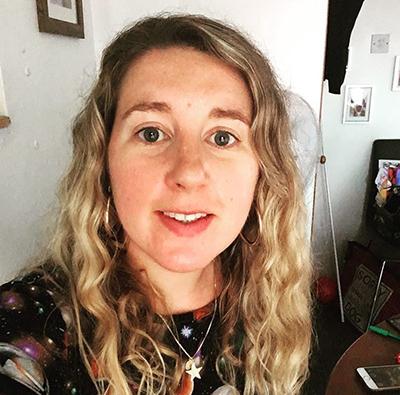
Dr Sadie Jones
Dr Sadie Jones is the Astronomy Public Engagement Leader in Physics and Astronomy at Southampton. Her job involves taking a mobile planetarium into schools to engage students with University’s Astrophysics research. She also runs Astronomy events in the local community, like space art workshops in Southampton Libraries.
“I love that I get to talk about such interesting astrophysics research as my job and I love creating activities to engage the public with it,” says Dr Jones. “It’s exciting that I get so much freedom; and I don’t just talk about my own research into Supermassive black holes, but I also get to tell the public and students about our research into the Northern Lights and Supernova.”
When she started her PhD, she had very few women colleagues and says that she did feel quite isolated.
“Now, ten years on, there are a lot more female Physics PhD students and a lot more academics,” she enthuses. “Also, we have an active award-winning ‘Women in Physics Network (WPN)’.
Dr Jones says she loves organising WPN socials like their annual ‘ice skating and pizza evening at West Quay’ in Southmpton.
“It feels like there is much more support now to allow women to stay within academia and work their way up to being a Professor,” she says.
Dr Jones’ key advice to other girls and women looking to get into the same field . . .
“I think the best advice I would give to someone looking to become an academic or become a science communicator is to make sure you say ‘yes’ to opportunities, especially if they take you out of your comfort zone.
“I said yes to becoming a planetarium presenter in my local science museum and then later I said yes to giving a talk on my PhD research to a local girls’ school and at the time I was a very shy person, who hated public speaking.
“I liked doing the research but I soon realised that what I absolutely loved doing was talking to people about science and trying to communicate it to them. I much preferred being out and about, and not in the office all the time. I feel very lucky that my job is literally talking about astrophysics research, and I would never have discovered this if I wasn’t brave enough to say ‘Yes’.”